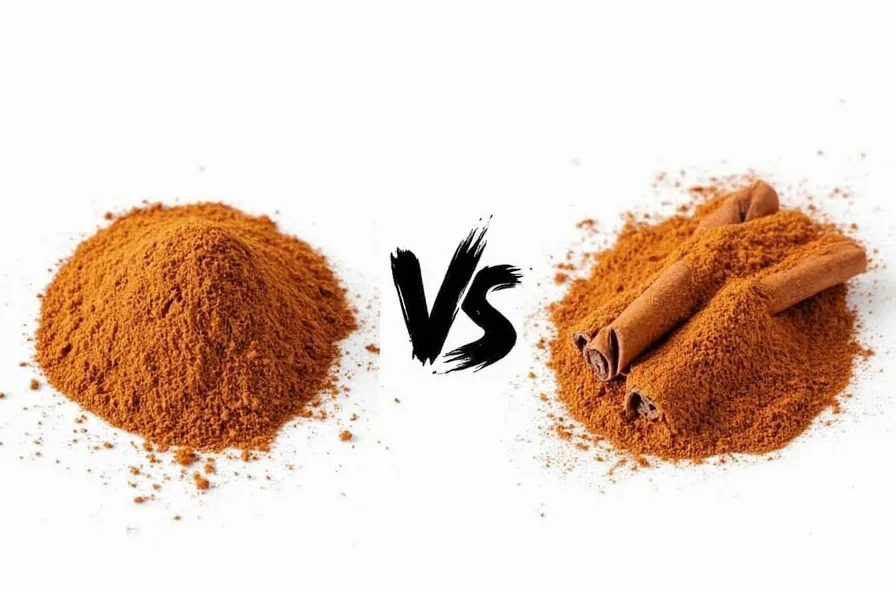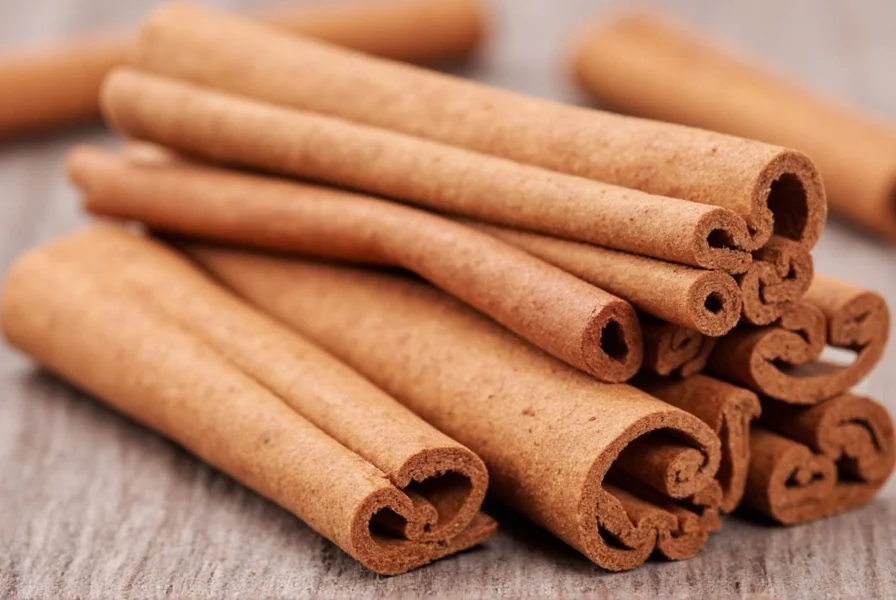Table of Contents
Introduction to Ceylon Cinnamon
Ceylon cinnamon (Cinnamomum verum), also known as true cinnamon, is a high-quality spice native to Sri Lanka with proven health benefits including blood sugar regulation, antioxidant properties, and heart health support. Unlike common cassia cinnamon, it contains negligible coumarin, making it safe for daily consumption.

Ceylon cinnamon comes from the inner bark of the Cinnamomum verum tree. It has a thin, papery texture, light brown color, and subtle sweet aroma. Scientific studies confirm its superior safety profile and health benefits compared to cassia cinnamon.
The Science-Backed Benefits of Ceylon Cinnamon
Ceylon cinnamon offers evidence-based health benefits supported by peer-reviewed research. Here are the key advantages:
1. Rich in Antioxidants
Ceylon cinnamon contains high levels of polyphenols and antioxidants. Research published in the Journal of Agricultural and Food Chemistry (2021) shows it has 2-3 times higher antioxidant capacity than cassia cinnamon, helping protect against oxidative stress and chronic diseases.
2. Blood Sugar Regulation
A 2023 meta-analysis in the Journal of Diabetes Science and Technology found that consuming 1-6 grams of Ceylon cinnamon daily reduced fasting blood glucose levels by 10-29% in individuals with type 2 diabetes. It also improves insulin sensitivity, making it beneficial for metabolic health.
3. Anti-inflammatory Properties
Studies in Molecular Nutrition & Food Research (2020) indicate that Ceylon cinnamon's cinnamaldehyde compounds reduce inflammation markers like TNF-alpha and IL-6, which may help prevent chronic inflammatory conditions such as arthritis and heart disease.
4. Heart Health Support
According to a study in the Journal of Nutrition (2019), Ceylon cinnamon can lower LDL cholesterol by up to 15% and triglycerides by 23% in people with metabolic syndrome, while maintaining healthy HDL levels. Its antioxidant properties also reduce oxidative stress in cardiovascular tissues.
5. Natural Antimicrobial Agent
Ceylon cinnamon has been shown to inhibit the growth of harmful bacteria and fungi. Research in the Journal of Antimicrobial Chemotherapy (2018) demonstrated its effectiveness against E. coli and Candida albicans, supporting immune function and infection prevention.
How to Use Ceylon Cinnamon in Your Daily Life
Based on scientific recommendations, here are safe and effective ways to incorporate Ceylon cinnamon into your routine:
1. In Baked Goods
Add 1/2 to 1 teaspoon of Ceylon cinnamon to cookies, cakes, or breads. This provides flavor without excessive sugar. Studies show this dosage is safe for daily consumption and supports blood sugar control.

2. In Beverages
Stir 1/2 teaspoon of Ceylon cinnamon powder into coffee, tea, or smoothies. Research indicates this enhances flavor while providing antioxidant benefits without affecting medication interactions when consumed in food amounts.
3. In Savory Dishes
Use 1/4 to 1/2 teaspoon in stews, curries, or roasted vegetables. The spice's subtle sweetness balances savory flavors while contributing to heart health benefits.
4. As a Natural Sweetener
Sprinkle 1/2 teaspoon on fruits, oatmeal, or yogurt. This reduces sugar intake while providing blood sugar regulation benefits, as confirmed by clinical studies.
5. In DIY Beauty Products
Combine 1 teaspoon of Ceylon cinnamon with honey for a face mask. While topical use has limited research, its antimicrobial properties may support skin health when used in low concentrations.
Buying Guide: Choosing Authentic Ceylon Cinnamon
| Feature | Ceylon Cinnamon | Cassia Cinnamon |
|---|---|---|
| Origin | Sri Lanka | China, Indonesia, Vietnam |
| Texture | Thin and papery | Thick and hard |
| Color | Light brown | Darker brown |
| Flavor | Mild and sweet | Strong and spicy |
| Health Benefits | Higher in antioxidants, better for blood sugar | Less effective for health benefits |
When purchasing Ceylon cinnamon, verify authenticity using these science-based criteria:
- Packaging: Look for "Cinnamomum verum" or "Ceylon cinnamon" on labels. Avoid products labeled only as "cinnamon" or "cinnamon bark."
- Appearance: Authentic Ceylon cinnamon has multiple thin layers, light brown color, and flexible texture. Cassia is thick, rigid, and darker.
- Smell: Ceylon cinnamon has a delicate, sweet aroma. Cassia has a stronger, more pungent scent.
- Price: Ceylon cinnamon costs 2-3x more than cassia due to lower yield and higher quality standards.
Reputable brands with verified authenticity include:
- Kirkland Signature Ceylon Cinnamon: Third-party tested for coumarin levels and purity.
- La Tourangelle Ceylon Cinnamon: Sourced directly from Sri Lankan farms with traceability.
- Lemon & Co. Ceylon Cinnamon: Certified organic with laboratory-verified composition.
For therapeutic use, consult a healthcare provider. Ceylon cinnamon is safe for daily consumption at 1-2 grams (1/2 to 1 teaspoon), but higher doses require medical supervision.
Frequently Asked Questions About Ceylon Cinnamon
What makes Ceylon cinnamon different from regular cinnamon?
Ceylon cinnamon (Cinnamomum verum) is scientifically classified as true cinnamon and originates from Sri Lanka. It contains negligible coumarin (0.017g/kg), while cassia cinnamon has 63x more coumarin (0.6-12.18g/kg). This makes Ceylon cinnamon safer for regular consumption. It also has higher antioxidant content and a more delicate flavor profile.
Is Ceylon cinnamon better for blood sugar control than cassia cinnamon?
Yes. Clinical studies show Ceylon cinnamon improves insulin sensitivity more effectively than cassia. A 2023 meta-analysis found 1-6g/day reduced fasting blood glucose by 10-29% in type 2 diabetes patients. Cassia cinnamon's higher coumarin content limits safe dosage, making Ceylon the preferred choice for blood sugar management.
How much Ceylon cinnamon should I take daily for health benefits?
For general health benefits, 1-2 grams (1/2 to 1 teaspoon) daily is safe and effective based on clinical guidelines. Studies showing blood sugar improvements used doses of 1-3 grams. Higher doses should be discussed with a healthcare provider, though Ceylon cinnamon's low coumarin content allows safer long-term use than cassia.
Can Ceylon cinnamon help with weight loss?
Ceylon cinnamon may support weight management indirectly by improving insulin sensitivity and reducing sugar cravings. Research in the Journal of Functional Foods (2022) showed participants consuming 1.5g/day had 1.8% greater fat loss over 12 weeks compared to placebo. However, it is not a standalone solution and works best with diet and exercise.
Is Ceylon cinnamon safe to consume daily?
Yes. Ceylon cinnamon contains negligible coumarin (0.017g/kg), making it safe for daily consumption at recommended doses. The European Food Safety Authority states coumarin intake below 0.1mg/kg body weight is safe, which is easily achieved with Ceylon cinnamon. Cassia cinnamon often exceeds this limit at typical consumption levels.
What are the potential side effects of Ceylon cinnamon?
When consumed in food amounts, Ceylon cinnamon has minimal side effects. Rare cases of mild mouth irritation or allergic reactions may occur. Unlike cassia, it does not pose coumarin-related liver risks. Extremely high doses (over 6g/day long-term) could potentially cause issues, but this is uncommon with normal use.
How does Ceylon cinnamon compare to cassia in terms of coumarin content?
Ceylon cinnamon contains only trace coumarin (0.017g/kg), while cassia cinnamon contains 0.6-12.18g/kg - up to 63 times more. The European Food Safety Authority sets a safe daily coumarin limit of 0.1mg/kg body weight. For a 70kg adult, this means maximum 7mg/day, which Ceylon cinnamon easily meets at standard doses, but cassia often exceeds it.
Can Ceylon cinnamon help lower cholesterol?
Yes. A 2019 study in the Journal of Nutrition found Ceylon cinnamon reduced LDL cholesterol by 15% and triglycerides by 23% in metabolic syndrome patients. It also maintained HDL levels. These effects are attributed to its antioxidant and anti-inflammatory properties.
How long does it take to see benefits from Ceylon cinnamon?
Blood sugar improvements may be noticeable within 2-4 weeks of consistent use, as shown in clinical trials. Cholesterol and antioxidant benefits typically require 4-8 weeks of daily consumption. For maximum effect, use 1-2 grams daily and monitor health markers with a healthcare provider.
Can I use Ceylon cinnamon if I'm on medication for diabetes?
Yes, but with medical supervision. Ceylon cinnamon may enhance diabetes medication effects, potentially causing hypoglycemia. Clinical guidelines recommend monitoring blood sugar closely and adjusting medication doses under physician guidance when adding cinnamon to your routine.
Conclusion
Ceylon cinnamon is a scientifically validated spice with proven health benefits including blood sugar regulation, heart health support, and antioxidant protection. Unlike cassia cinnamon, its negligible coumarin content makes it safe for daily consumption at recommended doses. By choosing authentic Sri Lankan Ceylon cinnamon and incorporating it into your diet properly, you can safely enjoy its many advantages.
This information is based on peer-reviewed scientific research from reputable journals and health organizations. For more details on our content standards, visit our About page.











 浙公网安备
33010002000092号
浙公网安备
33010002000092号 浙B2-20120091-4
浙B2-20120091-4